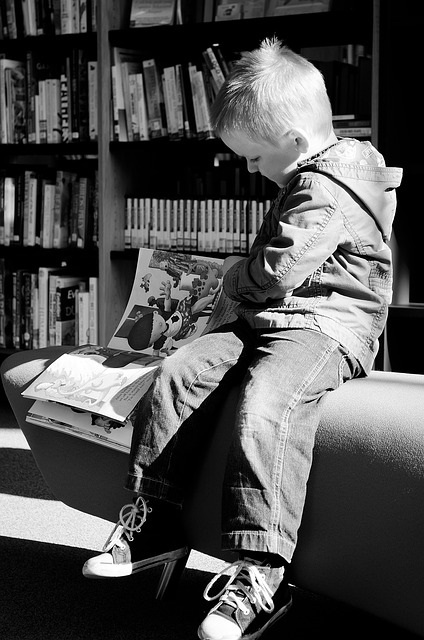
You’ve read to your child, “Picture Walked” through books, and discussed comprehension questions. You’ve taught the child the phonetic sound of each letter and the child can combine the sounds to form words. You’ve used a quality phonics-driven curriculum to provide the child with a solid foundation. According to this blog series you have done “everything right.”
But what happens when it falls apart? When your child isn’t reading on grade level or hates to read?
Laying a Foundation
As I stated last week, I taught each of our children how to read 6 -1 2 months prior to them entering Kindergarten. Each child was at or above grade level throughout Kindergarten.
Little Man (age 8) took off once he hit 1st grade and he currently is reading multiple grade levels ahead of his peers. I love to listen to him read out loud as it is smooth and emotion-filled. He would rather read than do about anything!
Peanut (age 6) is following in his brother’s footsteps. I wouldn’t be surprised if he isn’t also grade-levels ahead very soon as he is on the verge of a reading explosion.
But it hasn’t gone as smooth with my older two children. Even with a good foundation laid during preschool, they both hit a rock wall in 1st or 2nd grade. They hated to read as reading became very difficult.
What is a person to do?

Learning Holes
Sweet Pea (age 10) has what I call “Learning Holes” in her education. For whatever reason, things began to fall apart in the 2nd grade. Her reading level didn’t increase, her test scores dropped, and her spelling was atrocious. No matter what book I gave her to pique her interest and no matter what we or the school did, nothing improved. But she loved to listen to books on tape or be read too, so I knew it wasn’t a lack of desire. There was fear and something holding her back. Also, she continued to be at the top of her class in other academic areas, so we believed there wasn’t a disability.
Jump ahead two years, Sweet Pea started the 4th grade despising reading and unable to spell basic words. It was time to call in the troops. We headed to the speech clinic that Bubs uses and had private testing done to determine the depth of the issues.
Unfortunately, Sweet Pea passed each test with flying colors! Ugh…
Thankfully the speech path was wise to look beyond the standardized tests and realize there were issues that the tests didn’t quantify.
For the last six months, Sweet Pea has been meeting twice a week with a private speech path. They work on categorization, comprehension, vocabulary, and other areas of reading. We now realize that since she struggled so much to read, she missed a lot of growth that happens simply from reading to yourself. This learning carries into so many other areas of education.
In addition to this, she and I spend at least an hour each day at home on reading fluency and spelling. We are using the following books as our guide.

Phonics Pathways has been a wonderful book to teach spelling rules. I have learned so much! I will also be using this book with my boys this summer.

Reading Pathways contains simple exercises to teach reading fluency. I have used the easier portions with Peanut as well.
What I Have Learned
- Be Your Child’s Advocate
We have amazing public schools and Sweet Pea has had wonderful teachers. With that said, I must be my child’s biggest cheerleader and advocate. I knew in my gut something was wrong and wish I had started private therapy sooner. - What Works for One Child May Not Work for Another
I have no idea why Sweet Pea has holes in her learning yet her younger brothers do not. I don’t blame anyone. What matters is that we fill them and help her catch up. - While Starting Early Gives the Child a Step Ahead, It Doesn’t Guarantee Success
Sweet Pea had a good foundation of learning when starting Kindergarten. But as we’ve shared in this blog series, it doesn’t promise continued success. As a parent we must continually monitor progress and be co-teachers with the school. - Monitor Learning
Just because your child is reading at school, sit beside and listen to your child read at home. Observe body language and frustrations. If there are concerns, take these to the child’s teacher. - God Doesn’t Ask Me to Be Every Part of the Body (I Corinthians 12)
There are times to admit your weaknesses and call in support from those better equipped. I’m eternally grateful for the two speech paths God has placed in our lives. They have knowledge and experience that I don’t have…and that is okay. - God Doesn’t Waste Any Pain
The learning for Sweet Pea in this process has been much greater than how to spell the word “perseverance” correctly. I know that God is going to use her story and experience to bless others. Also this experience will make her an amazing elementary teacher if she follows her current path.
Already we have seen great improvement. I have every reason to believe with continued hard work and prayer that soon Sweet Pea will be caught up to her peers in reading fluency, spelling, and reading comprehension. The holes will be filled in and she is going to soar!

When There is More Going On
While Sweet Pea has holes in her learning that we are working to fill, I’ve had to come to grips with the fact that Bubs will most likely never be a fluent reader. Let me explain.
If you have followed this blog for a while, you know that Bubs (age 12) had open heart surgery at six-days-old. His first rollarcoaster month led to many struggles including Sensory Processing Disorder and Attention Deficit Hyperactivity Disorder (ADHD). He received Speech and Occupational Therapy from ages 3 to 6 and it was agreed that we would pause therapy at Kindergarten. (Read more about Our Story)
Half way through 1st grade his learning started falling apart. This was the first clue that there were larger issues which led us back to Speech Therapy and to a neuropsychologist.
To make a long story short, the neuropsyc gave him an Executive Function Disorder diagnosis. Teaming up with our amazing speech path, Bubs is on a path to success. From a reading standpoint, Bubs uses a web-based program called Bookshare where books are read to him while he follows highlighted words. It has opened his eyes to reading and he now begs to read! Praise the Lord!
What I Have Learned
- Expectations Differ Between Children
The teacher in me wanted to make Bubs a fluent reading. I had to let go of this expectation and realize it wasn’t something his brain make-up was going to allow him to do. And that was okay. Thankfully there are many options allowing him to read even if it isn’t in the traditional sense. - Keep the Goal in Mind
The goal in education is to guide a child to learn objectives, and then assessment is used to check for learning. Bubs has taught me that there are many ways to determine comprehension. He types all of his work and uses dictation software for writing assignments. Instead of the standard testing situation, questions are read to him and then he speak his answers. This is the very purpose of Individual Education Plans (IEP’s). By incorporating accommodations, Bubs is having an amazing school year.
So…what do I hope for you to take away from all of this?
A solid foundation is so important but we can’t put our faith in what we do as parents. God is in control of our children. And He loves them even more than we do. Our job is to teach them all we can, fight for them, and realize it takes the body of Christ to raise them. Then release the tight grip and let God do His thing.
